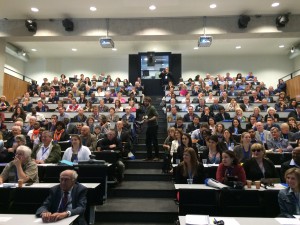Category: News
All latest news on Martin Mulder
Symposium Research on MOOCs, May 26, Wageningen University
On May 26 2015, 9:30 – 18:30hrs, the VOR Divisions ICT and Higher Education jointly organize a symposium on research on MOOCs. The symposium will take place in Wageningen University, the Netherlands.
During a number of presentations you will get an overview of current research into MOOCs and during the afternoon you will have the opportunity to listen to short case presentations by participants regarding research into MOOCs. But you can also provide your own cases to present at the symposium. There is an option on the registration form to indicate your interest in presenting a case.
Continue reading Symposium Research on MOOCs, May 26, Wageningen University
George Wilson Kasule successfully defended dissertation
George Wilson Kasule of Kyambogo University Kampala in Uganda successfully defended his dissertation in Wageningen University today. The topic of his thesis is Innovation Competence of University Teachers in Uganda. Co-Promotor was Dr. Renate Wesselink. Opponents (from left to right): Prof. emeritus Albert Pilot (University of Utrecht); Prof. Tiny van Boekel (Wageningen University); Prof. Michael Gessler (ITB Bremen). Continue reading George Wilson Kasule successfully defended dissertation
Upcoming conference ‘Competence and Excellence in Extension and Education’
Next in my conference Calender is the international conference on ‘Competence and Excellence in Extension and Education’, taking place in Wageningen, the Netherlands, on April 28-May 1. We are looking forward to welcoming over 350 participants, members of the AIAEE and ESEE, from all continents of the world. Continue reading Upcoming conference ‘Competence and Excellence in Extension and Education’
2015’s AERA
2015’s AERA in Chicago is almost over for me, but it was very rewarding. See the prentations page for downloadable papers and PPTs. On Saturday April 18 I had the pleasure to chair a high-level coherent and empirical research session on Competence Development in Workplace Learning. Continue reading 2015’s AERA
Downloadable paper list updated
Dear website visitor. I have updated the list with downloadable papers. Check it if you want and download the papers which you need for your work. Accurate referencing will be highly appreciated. Enjoy.
Call for WU sandwich PhD’s applications has opened
The call for WU sandwich PhD’s applications has opened. The deadline for proposals is set on Friday, May 15th 2015. Candidates must meet all of the eligibility requirements. See Website: http://www.wageningenur.nl/en/Education-Programmes/PhD-Programme/Categories-of-PhD-Candidates/Sandwich-PhD-Candidates.htm For a submission via the chair of Education and Competence Studies proposals must be built upon completed or running research of PhD candidates at ECS. Send project ideas to martin.mulder@wur.nl
Conference Competence and Performance in Extension and Education
Review on Design Principles for Developing Oral Presentation Competence accepted
The manuscript ‘Towards a Set of Design Principles for Developing Oral Presentation Competence: A Synthesis of Research in Higher Education Educational Research Review’, by Stan van Ginkel et al, has been accepted for publication in the Educational Research Review (Impact Factor: 3.107). The paper will appear online soon. Check http://www.journals.elsevier.com/educational-research-review/
Research agenda on training and development in business and industry revisited
Found back publication: Mulder, M. (1992). Toward a Comprehensive Framework for Research in Training in Business and Industry. International Journal of Lifelong Education, 11, 2, 139-155. The research agenda on training and development in business and industry published in that is still relevant.
‘Training and development, as one sector of lifelong education, plays an important role in the development of people and organizations. But in spite of its importance we have only a limited understanding of the interrelations of all the issues that have been raised in this sector during the past decades. This is partly due to the fact that there is only limited agreement on the research agenda for training and development of human resources in organizations. In this article we present both an approach to establish a set of priorities for such a comprehensive research agenda, and a proposal for such an agenda for research on training and development in business and industry. Preliminary results of a survey, content analysis, trainers’ inventory, trends analyses and cases studies were documented into a consultation document that was offered to a nominal group of 21 policy makers, training managers and other training practitioners. This group analysed a research proposal consisting of analytical propositions and accompanying candidate research questions. Three classes of research questions are distinguished: strategic, applied and fundamental. Within these categories 26 of the 35 stated research questions appeared to be of high priority. The remaining nine research questions are rated as of intermediate importance. None of the questions appeared to be considered irrelevant. We conclude this article by pointing out the most promising research areas in the field of training and development in business and industry by comparing our findings with those of Alden (1982): the contribution of training and development to organizational effectiveness, the access and mobility of people from target groups in the organization, cost-effectiveness of alternative approaches, the integration of training and development in human resource planning, success and failure factors in HRD interventions, labour relations in relation to training and development, and the impact of training and development on management development. We join Dopyera and Lay-Dipyera (1985) in calling for more experimental and quasi-experimental research, to produce knowledge about a series of causal relationships. This requires the availability of valid indicators of effectiveness of training and development interventions’. (Source: op cit)

